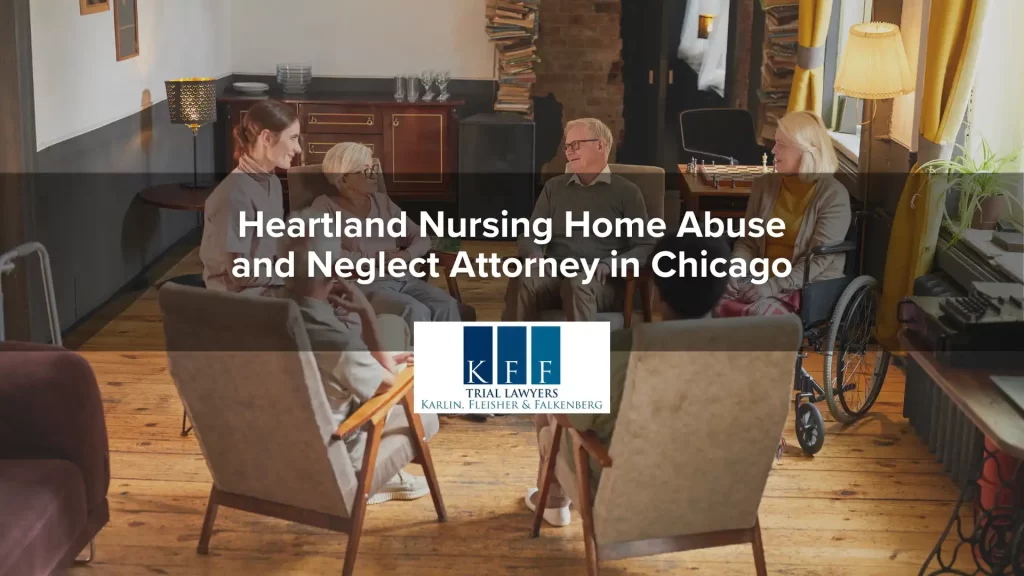
Heartland markets itself as a nursing home that provides residents with “gracious” daily living and a “homelike” environment. While the description sounds inviting, how much do you know about the day-to-day operations of nursing home facilities like Heartland. What about how they hire their caregivers and staff?
While we strive to make the best choice possible for our loved ones, it is not always possible to understand the full scope of a modern nursing home’s situation. Most facilities are for-profit entities. While some take their duty to the elderly seriously, others may value profit over health and safety.
At Karlin, Fleisher & Falkenberg, LLC, we have a team of experienced attorneys who meticulously and passionately investigate claims of nursing home abuse in the Chicago area. If you suspect that a cherished loved one may be suffering abuse while living under the roof of one of Heartland’s nursing home facilities, contact us today.
We take your suspicions seriously and will help get to the bottom of any possible nursing home misconduct. Don’t let your family member suffer in silence. Call us today at 312-346-8620 to schedule a consultation.
Definition of Nursing Home Abuse
Nursing home abuse can be defined as any type of damage inflicted upon an elderly resident by a person in a position of authority or power. Abusers can range from caregivers, nurses, other staff members, or even other residents. Often abusers will choose victims who may be cognitively unable to communicate or speak up about the abuse or whose condition may result in others questioning the validity of their abuse claims.
Types of Nursing Home Abuse
Understanding the different forms that abuse takes is crucial in detecting whether an elderly resident is being mistreated while living in a nursing home facility. While not as easily detected, emotional abuse takes an enormous toll on the physical and mental health of nursing home residents.
Elderly residents are also susceptible to financial abuse; according to a MetLife study, the elderly lose at least $2.9 billion dollars annually to financial abusers.
These are the most common forms of nursing home abuse:
- Physical abuse: Physical abuse may be one of the most easily recognized forms of abuse. However, that doesn’t mean all cases are caught or reported. Physical abuse is an act where the abuser physically inflicts harm on an elderly individual. A resident exhibiting unexplained bruises, cuts, burns, or broken bones may be suffering physical abuse.
- Emotional abuse: Perpetrators may not even believe they are committing abuse, but any form of yelling, insulting, berating, humiliating, isolating, or otherwise mentally manipulating an elderly individual is considered emotional abuse. The scars of this type of abuse may be harder to detect, but in general, look for signs of anxiety, depression, withdrawal from friends or activities, or changes in eating or sleeping patterns.
- Sexual abuse: Sexual abuse is the least reported form of abuse in nursing homes. The stigma of sexual abuse and the penchant for abusers to choose victims who can’t communicate clearly contribute to underreporting. Signs of abuse may be blood on sheets or undergarments, anxiety, pelvic injuries, bruises on thighs, panic attacks, and problems walking or sitting.
- Financial abuse: The elderly can become targets of theft, investment scams, forgery, or even being manipulated into giving someone access to their personal accounts. All of these things are financial abuse. If there has been a sudden change in a loved one’s financial situation or personal property goes missing from their room, they may be being financially abused.
- Neglect: The National Center on Elder Abuse does count neglect as a form of elder abuse. Neglect is a pattern of behavior by a caregiver that deprives a nursing home residents of their basic necessities. Some signs that may indicate neglect include dehydration, malnutrition, bedsores, change in medical condition, or unchanged or unwashed linens and clothing.
What Causes Nursing Home Abuse?
 One of the most common questions that people ask is, how did this happen? While it is true that nursing homes are required to provide a standard of care and are overseen by federal regulators, abuse within the walls of nursing homes happens frequently.
One of the most common questions that people ask is, how did this happen? While it is true that nursing homes are required to provide a standard of care and are overseen by federal regulators, abuse within the walls of nursing homes happens frequently.
The World Health Organization found that two out of three nursing home staff members actually admitted to committing some form of elder abuse. Factors from a lack of reporting to nursing homes being reluctant to investigate claims because it could jeopardize their reputation or open them up to lawsuits contribute to the continuing culture of abuse.
These are some of the more common factors that contribute to abuse in nursing home settings:
- Understaffing: Chronic understaffing is a major contributing factor to cases of abuse. When a nursing home does not properly staff its facility, the resulting shortage of caregivers places an undue burden on staff. Overworked staff members may become resentful or frustrated and take those frustrations out on residents in the form of physical or emotional abuse. They may also be so overburdened that they neglect residents or their duties.
- Poor hiring practices: A nursing home is responsible for screening all potential employers before hiring them. Failure to conduct proper background screenings may result in someone with a criminal background being hired or a caregiver being employed who does not have the proper credentials, experience, or educational requirements.
- Inadequate training procedures: The nursing home not only has a duty to ensure all staff have the proper training and credentials before being hired, but they also have a duty to provide ongoing training and make sure all staff is familiar with the rules and regulations of the facility itself. Inadequate training on the part of the nursing home may contribute to cases of neglect or abuse as a result of ignorance.
- Poor management or oversight: Many nursing homes are for-profit businesses. As such, some places value the power of the dollar and maximizing profits over maximizing resident care. Decisions at the corporate level may mean cutting corners to stay in the black. It may also mean they may be slower or reluctant to investigate abuse or misconduct claims because it could open them up to federal penalties and expensive lawsuits.
How Can Karlin, Fleisher & Falkenberg, LLC Help Nursing Home Residents?
At Karlin, Fleisher & Falkenberg, LLC, we understand that you and your loved one are suffering. It is painful to see someone you care about treated with such disrespect, to know that their rights are being violated by the very people chosen to care for them. The legal team at Karlin, Fleisher & Falkenberg, LLC treats you and your family with the compassion and dignity you deserve while aggressively investigating your claims of abuse.
If you suspect that your loved one may be suffering from abuse while living in a Heartland nursing home facility, contact our Chicago nursing home abuse attorneys at 312-346-8620 to schedule a consultation.
